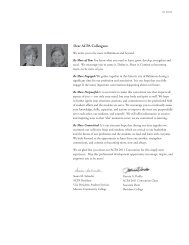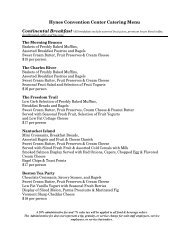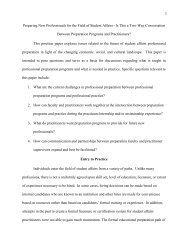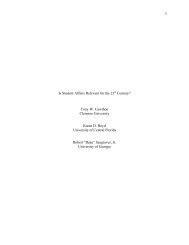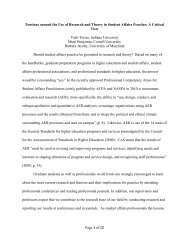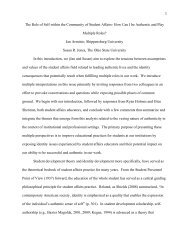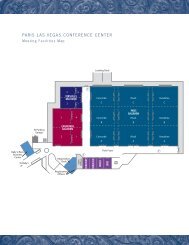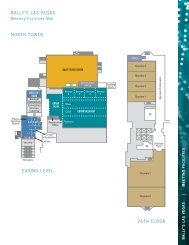Educating Global Leaders:
Educating Global Leaders:
Educating Global Leaders:
Create successful ePaper yourself
Turn your PDF publications into a flip-book with our unique Google optimized e-Paper software.
<strong>Educating</strong> <strong>Global</strong> <strong>Leaders</strong>:<br />
Defining <strong>Global</strong> <strong>Leaders</strong>hip Competency<br />
Development in College Students<br />
Ana Maia<br />
Assistant Director for <strong>Leaders</strong>hip and Organization Development<br />
Stetson University
ò Introduction<br />
ò Literature Review<br />
ò Activity<br />
Outline<br />
ò The <strong>Global</strong> <strong>Leaders</strong>hip Competency Model (GLCM)<br />
ò Applying the GLCM to Your Campus<br />
ò Stetson <strong>Global</strong> <strong>Leaders</strong>hip Program<br />
ò Discussion Questions<br />
ò Q&A
Introduction<br />
ò <strong>Global</strong>ization is shaping the lives of citizens everywhere<br />
ò America’s interest and need to address global issues<br />
ò National Security (Hunter, 2004; Cummings, 2001)<br />
ò <strong>Global</strong> Economy (Reimers, 2009).<br />
ò America Needs Socially Responsible, <strong>Global</strong> <strong>Leaders</strong> (AAC&U, 2006)<br />
ò <strong>Global</strong> <strong>Leaders</strong> (Morrison, 2000)<br />
ò Studies focus on the development of adults in the international business<br />
field (Osland, 2008; Mendenhall et. al., 2008; House et. al, 2004).<br />
ò American Colleges and Universities<br />
ò Council on International Educational Exchange’s (CIEE, 1992) published<br />
a report on <strong>Educating</strong> for <strong>Global</strong> Competence<br />
ò American Council on Education (ACE) recommended colleges and<br />
universities to partner with the federal, state and local governments
Introduction<br />
ò American Colleges and Universities (continued)<br />
ò The New <strong>Global</strong> Agenda (McMurtie, 2007)<br />
ò <strong>Educating</strong> for Socially Responsible <strong>Leaders</strong><br />
ò Institutions support student leadership development<br />
(Komives, 2011)<br />
ò Graduates as <strong>Global</strong>ly Competent <strong>Leaders</strong><br />
ò American universities and colleges are basing their<br />
education on a definition of global competency that is<br />
vague and inconsistent (Hunter, 2004)<br />
ò Need of a well-defined model of global competency<br />
(Bresciani, 2008)
What Competencies Should a<br />
<strong>Global</strong> Leader Posses?<br />
Discuss in pairs and share
Literature Review<br />
ò <strong>Global</strong> Competency<br />
Development in<br />
College Students<br />
ò Similarities<br />
between global<br />
competency and<br />
intercultural<br />
sensitivity (Oslon<br />
and Kroeger, 2001)<br />
ò Hunter’s research<br />
(2004)<br />
Hunter, 2004
The Social Change Model of<br />
<strong>Leaders</strong>hip Development<br />
HERI, 1996
Mendenhall and Osland (2002)
The <strong>Global</strong> <strong>Leaders</strong>hip<br />
ò Individual Competencies<br />
ò <strong>Global</strong> Knowledge<br />
ò Authenticity<br />
ò <strong>Global</strong> Mindset<br />
ò Group Competencies<br />
Competency Model<br />
ò Intercultural Relationship Building<br />
ò Collective Envisioning<br />
ò Community/<strong>Global</strong> Competency<br />
ò <strong>Global</strong> Citizenship
<strong>Global</strong> Knowledge<br />
<strong>Global</strong> Citizenship<br />
Authenticity<br />
Collective<br />
Envisioning<br />
Intercultural<br />
Relationship<br />
Building<br />
<strong>Global</strong> Mind-Set
<strong>Global</strong> knowledge<br />
ò Individual’s knowledge of world history and current events across<br />
the globe.<br />
ò Substantive knowledge – knowledge of world issues, languages,<br />
cultures, human choices, and global dynamics – to understand and<br />
function in a globally interdependent world
ò Conscientious<br />
Authenticity<br />
ò Individuals acknowledge their own values and beliefs and<br />
act on them with veracity<br />
ò Aware and acting on their own attitudes, beliefs, emotions,<br />
and values<br />
ò Are self-‐aware and have a deep understanding of their own<br />
cultural norms and expectations<br />
ò This includes integrity, accountability and dedication to<br />
personal transformation.
<strong>Global</strong> mindset<br />
ò Elevated understanding of other cultures and values and an<br />
appreciation for differences<br />
ò Open-‐minded attitude and an acceptance of diverse cultural values<br />
ò Displaying a non-‐judgmental attitude, willingness to take risks, and<br />
openness to new experiences such as appreciation for cultural<br />
diversity and have empathy for other viewpoints<br />
ò This includes having a perceptual understanding examine the<br />
external environment in a complex manner by looking beyond<br />
stereotypes, acknowledging the presence of differing cultural<br />
perspectives and being comfortable with ambiguity
Intercultural<br />
relationship building<br />
ò Includes the ability to build trusting, personal relationships with<br />
individuals across different cultural contexts; to inspire and empower<br />
individuals from other cultures to produce positive social change; to<br />
be effective cross-‐cultural communicators.<br />
ò Valuing and respecting cross-‐cultural contradictions and exhibiting<br />
acceptance of intercultural complexities and disagreement.<br />
ò Collaborating across cultures, including the ability to network with<br />
individuals across different cultures, is vital.<br />
ò Building partnerships and alliances with citizens
Collective envisioning<br />
ò Entails joining forces with others to create a shared<br />
vision for the group or organization. Through visioning,<br />
global leaders articulate the organization’s attainable<br />
vision to serve as catalysts for cultural and strategic<br />
change.
<strong>Global</strong> citizenship<br />
ò ExempliKied by individuals actively involved in the local<br />
and global communities<br />
ò It entails global organizing expertise and the dedication<br />
to promote universal human rights
Appling the<br />
GLCM to Your<br />
Campus
Mission,<br />
Vision and Values<br />
ò How do these competencies relate to your department’s<br />
and the University’s mission and values?<br />
ò Does it align with the institution’s values?<br />
ò How can these competency shape your programs’<br />
learning outcomes?<br />
ò How do they relate to CAS standards?<br />
Komives, S. R., Dugan, J., Owen, J. E., Slack, C., & Wagner, W. (Eds). (2011). Handbook for student<br />
leadership development (2 nd ed.). A publication of the National Clearinghouse for <strong>Leaders</strong>hip Programs.<br />
San Francisco, CA: Jossey-Bass.
CAS Standards<br />
ò CAS (2009) Six learning domains<br />
1. Knowledge acquisitions, construction, integration and<br />
applications<br />
2. Cognitive complexity<br />
3. Intrapersonal development<br />
4. Interpersonal development<br />
5. Humanitarianism and civic engagement<br />
6. Practical competence
AAC&U’s<br />
LEAP Learning Outcomes<br />
ò Understanding diverse cultures and understanding<br />
cultures as diverse<br />
ò Developing intercultural skills<br />
ò Understanding global process<br />
ò Preparing for citizenship both local and global
Stetson’s Mission<br />
Our mission at Stetson University is to provide an excellent education in a creative<br />
community where learning and values meet, and to foster in students the qualities of mind<br />
and heart that will prepare them to reach their full potential as informed citizens of local<br />
communities and the world.<br />
At Stetson, the art of teaching is practiced through programs solidly grounded in a<br />
tradition of liberal learning that stimulates critical thinking, imaginative inquiry, creative<br />
expression, and lively intellectual debate. The art of learning is enhanced through small<br />
interactive classes, close student-faculty alliances, and collaborative approaches that<br />
provide the foundation for rewarding careers and advanced study in selective graduate and<br />
professional programs. We embrace diverse methodologies to foster effective<br />
communication, information and technological literacy, and aesthetic appreciation. We<br />
encourage the development of informed convictions, independent judgment, and lifelong<br />
commitments to learning that are characteristic features of the enlightened citizen. In<br />
bringing together learning and values, the University encourages all of its members to<br />
demonstrate personal integrity; to develop an appreciation for the spiritual dimension of<br />
life; to embrace leadership in an increasingly complex, interdependent, and<br />
technological world; and to commit to active forms of social responsibility.
Personalizing<br />
<strong>Global</strong> knowledge<br />
ò Individual’s knowledge of world history and current events across<br />
the globe<br />
ò Substantive knowledge – knowledge of world issues, languages,<br />
cultures, human choices, and global dynamics – to understand and<br />
function in a globally interdependent world<br />
ò Intellectual Development is a commitment from the University and<br />
from students to achieve excellence in academics, to foster the spirit<br />
of exploration that drives an engaged and active mind, to cultivate<br />
rigorous methods of academic inquiry, to model and support<br />
absolute integrity, and to value creativity and professionalism
<strong>Global</strong> Knowledge<br />
ò Rigorous dedication to continually explore systemic<br />
societal issues and simultaneously embrace global<br />
histories and current events
Personalizing<br />
<strong>Global</strong> Citizenship<br />
ò ExempliKied by individuals actively involved in the local and<br />
global communities<br />
ò It entails global organizing expertise and the dedication to<br />
promote universal human rights<br />
ò <strong>Global</strong> Citizenship is an important part of Stetson’s mission<br />
to prepare students to be informed, active, and engaged<br />
citizens of both local communities and the world. <strong>Global</strong><br />
citizenship includes University and individual commitments to<br />
community engagement, diversity and inclusion,<br />
environmental responsibility, and social justice.
<strong>Global</strong> Citizenship<br />
ò Active involvement in local and global communities as<br />
well as an individual life-‐long commitment to positive<br />
global change. This includes personal and social<br />
responsibility to promote community engagement,<br />
diversity and inclusion, environmental responsibility,<br />
and social justice.
<strong>Global</strong> <strong>Leaders</strong>hip Program<br />
ò Vision:<br />
ò To transform inspired significant global leaders<br />
ò Mission Statement:<br />
ò To transform inspired significant global leaders through<br />
integrated experiential learning opportunities grounded in<br />
Stetson’s mission, values and commitment to rigor,<br />
relationship and responsibility
GLP<br />
Program Details:<br />
ò 12-20 students each year<br />
ò 7 semester program (3.5 years)<br />
ò Start on Spring of participant’s 1 st year<br />
ò A minimum 3.0 GPA Requirement<br />
ò Cohort Model<br />
ò Study Abroad<br />
ò Spring of the participant’s 2 nd year<br />
ò A weekly Colloquium<br />
ò One hour meeting<br />
ò A 1 credit class in the future<br />
ò The centerpiece/glue of the program<br />
ò Paired and integrated with 3 Courses (credit bearing) each year<br />
ò Experiential learning opportunities<br />
Goal: Move from Program to Certificate Program to <strong>Global</strong> <strong>Leaders</strong>hip Minor
ò Know<br />
ò Be<br />
ò Do<br />
Learning Outcomes<br />
ò What content knowledge do students need to have?<br />
ò What do we hope student become?<br />
ò How do student live their lives as leaders?<br />
ò How do students practice and refine their skills?
Bloom’s Taxonomy
Program in Detail<br />
Semester Learning Outcomes
Program at a Glance<br />
Semester 1 Semester 2 Semester 3 Semester 4 Semester 5 Semester 6 Semester 7<br />
Introduc5on<br />
to <strong>Global</strong><br />
<strong>Leaders</strong>hip<br />
Colloquium<br />
(No Credit)<br />
ATend Social<br />
Jus5ce<br />
<strong>Leaders</strong>hip<br />
Retreat<br />
Enhance<br />
Involvement<br />
on Campus<br />
<strong>Leaders</strong>hip,<br />
Self and<br />
Society<br />
Colloquium<br />
(1 Credit)<br />
Course<br />
(1 Unit)<br />
Community<br />
Service Project<br />
Alterna5ve Breaks Par5cipant<br />
Mul5cultural<br />
<strong>Leaders</strong>hip<br />
Online<br />
Colloquium<br />
(1 Credit)<br />
Study Abroad<br />
Capstone<br />
Research<br />
Begins<br />
Organiza5onal<br />
<strong>Leaders</strong>hip<br />
and Diversity<br />
Applica5ons<br />
Colloquium<br />
(1 Credit)<br />
Course<br />
(1 Unit)<br />
<strong>Leaders</strong>hip<br />
Posi5on On<br />
Campus<br />
Capstone<br />
Proposal Due<br />
Peer<br />
<strong>Leaders</strong>hip<br />
and Team<br />
Dynamics<br />
Colloquium<br />
(1 Credit)<br />
Facilitate<br />
Mul5cultural<br />
<strong>Leaders</strong>hip<br />
Retreat<br />
Alterna5ve<br />
Breaks Leader<br />
Mentoring a<br />
First Year<br />
Civic<br />
Engagement<br />
and Crea5ng<br />
Posi5ve <strong>Global</strong><br />
Change<br />
Colloquium<br />
(1 Credit)<br />
Course<br />
(1 Unit)<br />
Making a<br />
Significant<br />
Mark:<br />
<strong>Leaders</strong>hip for<br />
Social Jus5ce<br />
Colloquium<br />
(1 Credit)<br />
Mentor a<br />
Second Year<br />
Student<br />
Implement Capstone Project
Intro to <strong>Global</strong> <strong>Leaders</strong>hip<br />
ò Semester 1<br />
ò Introductory Stage: Knowing<br />
ò Focus: Individual<br />
ò Competency: Authenticity<br />
ò Learning Outcomes:<br />
As a result of participating in the GLP Semester 1, students will be able to:<br />
ò write about the history of leadership<br />
ò illustrate at least four current leadership theories<br />
ò recall the six elements of the <strong>Global</strong> <strong>Leaders</strong>hip Competency Model<br />
ò recognize and deconstruct their top five Clifton strengths<br />
ò name their own values and beliefs<br />
ò describe and examine their own cultural heritage<br />
ò list their own cultural norms and expectations<br />
ò describe their own social identities and how these identities intersect<br />
ò set individuals goals for the <strong>Global</strong> <strong>Leaders</strong>hip Program
Program at a Glance<br />
Semester 1 Semester 2 Semester 3 Semester 4 Semester 5 Semester 6 Semester 7<br />
Introduc5on<br />
to <strong>Global</strong><br />
<strong>Leaders</strong>hip<br />
Colloquium<br />
(No Credit)<br />
ATend Social<br />
Jus5ce<br />
<strong>Leaders</strong>hip<br />
Retreat<br />
Enhance<br />
Involvement<br />
on Campus<br />
<strong>Leaders</strong>hip,<br />
Self and<br />
Society<br />
Colloquium<br />
(1 Credit)<br />
Course<br />
(1 Unit)<br />
Community<br />
Service Project<br />
Alterna5ve Breaks Par5cipant<br />
Mul5cultural<br />
<strong>Leaders</strong>hip<br />
Online<br />
Colloquium<br />
(1 Credit)<br />
Study Abroad<br />
Capstone<br />
Research<br />
Begins<br />
Organiza5onal<br />
<strong>Leaders</strong>hip<br />
and Diversity<br />
Applica5ons<br />
Colloquium<br />
(1 Credit)<br />
Course<br />
(1 Unit)<br />
<strong>Leaders</strong>hip<br />
Posi5on On<br />
Campus<br />
Capstone<br />
Proposal Due<br />
Peer<br />
<strong>Leaders</strong>hip<br />
and Team<br />
Dynamics<br />
Colloquium<br />
(1 Credit)<br />
Facilitate<br />
Mul5cultural<br />
<strong>Leaders</strong>hip<br />
Retreat<br />
Alterna5ve<br />
Breaks Leader<br />
Mentoring a<br />
First Year<br />
Civic<br />
Engagement<br />
and Crea5ng<br />
Posi5ve <strong>Global</strong><br />
Change<br />
Colloquium<br />
(1 Credit)<br />
Course<br />
(1 Unit)<br />
Making a<br />
Significant<br />
Mark:<br />
<strong>Leaders</strong>hip for<br />
Social Jus5ce<br />
Colloquium<br />
(1 Credit)<br />
Mentor a<br />
Second Year<br />
Student<br />
Implement Capstone Project
<strong>Leaders</strong>hip, Self and Society<br />
ò Semester 2<br />
ò Introductory Stage: Knowing<br />
ò Focus: Individual<br />
ò Competencies: <strong>Global</strong> Knowledge, <strong>Global</strong> Mindset<br />
ò Learning Outcomes:<br />
As a result of participating in the GLP Semester 2, students will be able to:<br />
ò discuss systemic societal issues as they pertain to a specific population<br />
ò demonstrate an understanding of the uses of power and nature of<br />
oppression<br />
ò recognize, compare and contrast at least two cultural perspectives<br />
different from their own<br />
ò deconstruct their own social identities and how these identities intersect<br />
ò gain knowledge on current events and other histories<br />
ò identify and discuss the history of at least one culture other than your<br />
own<br />
ò *Selected one-unit courses will fulfill underlined learning outcomes
Program at a Glance<br />
Semester 1 Semester 2 Semester 3 Semester 4 Semester 5 Semester 6 Semester 7<br />
Introduc5on<br />
to <strong>Global</strong><br />
<strong>Leaders</strong>hip<br />
Colloquium<br />
(No Credit)<br />
ATend Social<br />
Jus5ce<br />
<strong>Leaders</strong>hip<br />
Retreat<br />
Enhance<br />
Involvement<br />
on Campus<br />
<strong>Leaders</strong>hip,<br />
Self and<br />
Society<br />
Colloquium<br />
(1 Credit)<br />
Course<br />
(1 Unit)<br />
Community<br />
Service Project<br />
Alterna5ve Breaks Par5cipant<br />
Mul5cultural<br />
<strong>Leaders</strong>hip<br />
Online<br />
Colloquium<br />
(1 Credit)<br />
Study Abroad<br />
Capstone<br />
Research<br />
Begins<br />
Organiza5onal<br />
<strong>Leaders</strong>hip<br />
and Diversity<br />
Applica5ons<br />
Colloquium<br />
(1 Credit)<br />
Course<br />
(1 Unit)<br />
<strong>Leaders</strong>hip<br />
Posi5on On<br />
Campus<br />
Capstone<br />
Proposal Due<br />
Peer<br />
<strong>Leaders</strong>hip<br />
and Team<br />
Dynamics<br />
Colloquium<br />
(1 Credit)<br />
Facilitate<br />
Mul5cultural<br />
<strong>Leaders</strong>hip<br />
Retreat<br />
Alterna5ve<br />
Breaks Leader<br />
Mentoring a<br />
First Year<br />
Civic<br />
Engagement<br />
and Crea5ng<br />
Posi5ve <strong>Global</strong><br />
Change<br />
Colloquium<br />
(1 Credit)<br />
Course<br />
(1 Unit)<br />
Making a<br />
Significant<br />
Mark:<br />
<strong>Leaders</strong>hip for<br />
Social Jus5ce<br />
Colloquium<br />
(1 Credit)<br />
Mentor a<br />
Second Year<br />
Student<br />
Implement Capstone Project
Multicultural <strong>Leaders</strong>hip<br />
(Abroad Semester)<br />
ò Semester 3 (Online)<br />
ò Deeper Learning: Being<br />
ò Focus: Individual and Group<br />
ò Competencies: Authenticity, <strong>Global</strong> Knowledge, <strong>Global</strong> Mindset and<br />
Intercultural Relationship Building<br />
ò Learning Outcomes:<br />
As a result of participating in the GLP Semester 3, students will be able to:<br />
ò examine the history and culture of the country in which they are<br />
currently residing<br />
ò adapt to and live in another culture and reflect/report on this experience<br />
ò discuss their own commitment to life-long learning<br />
ò participate in a community engagement in the host country<br />
ò compare and contrast their own cultural perspectives with the host<br />
country’s<br />
ò demonstrate an open-minded attitude by creating a digital story based<br />
on another cultural viewpoint
Program at a Glance<br />
Semester 1 Semester 2 Semester 3 Semester 4 Semester 5 Semester 6 Semester 7<br />
Introduc5on<br />
to <strong>Global</strong><br />
<strong>Leaders</strong>hip<br />
Colloquium<br />
(No Credit)<br />
ATend Social<br />
Jus5ce<br />
<strong>Leaders</strong>hip<br />
Retreat<br />
Enhance<br />
Involvement<br />
on Campus<br />
<strong>Leaders</strong>hip,<br />
Self and<br />
Society<br />
Colloquium<br />
(1 Credit)<br />
Course<br />
(1 Unit)<br />
Community<br />
Service Project<br />
Alterna5ve Breaks Par5cipant<br />
Mul5cultural<br />
<strong>Leaders</strong>hip<br />
Online<br />
Colloquium<br />
(1 Credit)<br />
Study Abroad<br />
Capstone<br />
Research<br />
Begins<br />
Organiza5onal<br />
<strong>Leaders</strong>hip<br />
and Diversity<br />
Applica5ons<br />
Colloquium<br />
(1 Credit)<br />
Course<br />
(1 Unit)<br />
<strong>Leaders</strong>hip<br />
Posi5on On<br />
Campus<br />
Capstone<br />
Proposal Due<br />
Peer<br />
<strong>Leaders</strong>hip<br />
and Team<br />
Dynamics<br />
Colloquium<br />
(1 Credit)<br />
Facilitate<br />
Mul5cultural<br />
<strong>Leaders</strong>hip<br />
Retreat<br />
Alterna5ve<br />
Breaks Leader<br />
Mentoring a<br />
First Year<br />
Civic<br />
Engagement<br />
and Crea5ng<br />
Posi5ve <strong>Global</strong><br />
Change<br />
Colloquium<br />
(1 Credit)<br />
Course<br />
(1 Unit)<br />
Making a<br />
Significant<br />
Mark:<br />
<strong>Leaders</strong>hip for<br />
Social Jus5ce<br />
Colloquium<br />
(1 Credit)<br />
Mentor a<br />
Second Year<br />
Student<br />
Implement Capstone Project
Organizational <strong>Leaders</strong>hip<br />
and Diversity Applications<br />
ò Semester 4<br />
ò Deeper Learning: Being<br />
ò Focus: Group<br />
ò Competencies: <strong>Global</strong> Knowledge, Collective Envisioning, <strong>Global</strong><br />
Citizenship<br />
ò Learning Outcomes:<br />
As a result of participating in the GLP Semester 4, students will be able to:<br />
ò examine how their strengths affect their role as a Stetson student leader<br />
ò articulate a shared, common vision for their student organization and<br />
for their capstone project<br />
ò research and prepare a capstone proposal to create positive global<br />
change with another global leadership scholar<br />
ò interpret the uses of power and nature of oppression in systemic societal<br />
issues*<br />
ò demonstrate active involvement in the local Stetson community<br />
ò critique current global issues from at least two differing perspectives<br />
ò *Selected one-unit courses will fulfill underlined learning outcomes
Program at a Glance<br />
Semester 1 Semester 2 Semester 3 Semester 4 Semester 5 Semester 6 Semester 7<br />
Introduc5on<br />
to <strong>Global</strong><br />
<strong>Leaders</strong>hip<br />
Colloquium<br />
(No Credit)<br />
ATend Social<br />
Jus5ce<br />
<strong>Leaders</strong>hip<br />
Retreat<br />
Enhance<br />
Involvement<br />
on Campus<br />
<strong>Leaders</strong>hip,<br />
Self and<br />
Society<br />
Colloquium<br />
(1 Credit)<br />
Course<br />
(1 Unit)<br />
Community<br />
Service Project<br />
Alterna5ve Breaks Par5cipant<br />
Mul5cultural<br />
<strong>Leaders</strong>hip<br />
Online<br />
Colloquium<br />
(1 Credit)<br />
Study Abroad<br />
Capstone<br />
Research<br />
Begins<br />
Organiza5onal<br />
<strong>Leaders</strong>hip<br />
and Diversity<br />
Applica5ons<br />
Colloquium<br />
(1 Credit)<br />
Course<br />
(1 Unit)<br />
<strong>Leaders</strong>hip<br />
Posi5on On<br />
Campus<br />
Capstone<br />
Proposal Due<br />
Peer<br />
<strong>Leaders</strong>hip<br />
and Team<br />
Dynamics<br />
Colloquium<br />
(1 Credit)<br />
Facilitate<br />
Mul5cultural<br />
<strong>Leaders</strong>hip<br />
Retreat<br />
Alterna5ve<br />
Breaks Leader<br />
Mentoring a<br />
First Year<br />
Civic<br />
Engagement<br />
and Crea5ng<br />
Posi5ve <strong>Global</strong><br />
Change<br />
Colloquium<br />
(1 Credit)<br />
Course<br />
(1 Unit)<br />
Making a<br />
Significant<br />
Mark:<br />
<strong>Leaders</strong>hip for<br />
Social Jus5ce<br />
Colloquium<br />
(1 Credit)<br />
Mentor a<br />
Second Year<br />
Student<br />
Implement Capstone Project
Peer <strong>Leaders</strong>hip and Team<br />
Dynamics<br />
ò Semester 5<br />
ò Mastery Level: Doing<br />
ò Focus: Group<br />
ò Competency: Intercultural Relationship Building<br />
ò Learning Outcomes:<br />
As a result of participating in the GLP Semester 5, students will be able to:<br />
ò evaluate how their strengths affect their relationship with others and in a<br />
team setting<br />
ò form a positive and professional relationship with a national or<br />
international community partner<br />
ò plan and lead an Alternative Break or Hatter Trek experience<br />
ò serve as co-facilitator for the Multicultural <strong>Leaders</strong>hip retreat<br />
ò demonstrate cultural competency by managing a cross-cultural<br />
contradiction or disagreement with another individual or group<br />
ò revise and create the action plan for their capstone proposal
Program at a Glance<br />
Semester 1 Semester 2 Semester 3 Semester 4 Semester 5 Semester 6 Semester 7<br />
Introduc5on<br />
to <strong>Global</strong><br />
<strong>Leaders</strong>hip<br />
Colloquium<br />
(No Credit)<br />
ATend Social<br />
Jus5ce<br />
<strong>Leaders</strong>hip<br />
Retreat<br />
Enhance<br />
Involvement<br />
on Campus<br />
<strong>Leaders</strong>hip,<br />
Self and<br />
Society<br />
Colloquium<br />
(1 Credit)<br />
Course<br />
(1 Unit)<br />
Community<br />
Service Project<br />
Alterna5ve Breaks Par5cipant<br />
Mul5cultural<br />
<strong>Leaders</strong>hip<br />
Online<br />
Colloquium<br />
(1 Credit)<br />
Study Abroad<br />
Capstone<br />
Research<br />
Begins<br />
Organiza5onal<br />
<strong>Leaders</strong>hip<br />
and Diversity<br />
Applica5ons<br />
Colloquium<br />
(1 Credit)<br />
Course<br />
(1 Unit)<br />
<strong>Leaders</strong>hip<br />
Posi5on On<br />
Campus<br />
Capstone<br />
Proposal Due<br />
Peer<br />
<strong>Leaders</strong>hip<br />
and Team<br />
Dynamics<br />
Colloquium<br />
(1 Credit)<br />
Facilitate<br />
Mul5cultural<br />
<strong>Leaders</strong>hip<br />
Retreat<br />
Alterna5ve<br />
Breaks Leader<br />
Mentoring a<br />
First Year<br />
Civic<br />
Engagement<br />
and Crea5ng<br />
Posi5ve <strong>Global</strong><br />
Change<br />
Colloquium<br />
(1 Credit)<br />
Course<br />
(1 Unit)<br />
Making a<br />
Significant<br />
Mark:<br />
<strong>Leaders</strong>hip for<br />
Social Jus5ce<br />
Colloquium<br />
(1 Credit)<br />
Mentor a<br />
Second Year<br />
Student<br />
Implement Capstone Project
Creating<br />
Positive <strong>Global</strong> Change<br />
ò Semester 6<br />
ò Mastery Level: Doing<br />
ò Focus: <strong>Global</strong> Community<br />
ò Competency: <strong>Global</strong> Citizenship<br />
ò Learning Outcomes:<br />
ò As a result of participating in the GLP Semester 6, students will be<br />
able to:<br />
ò justify and defend their stance on human rights and civic<br />
responsibility<br />
ò implement phase one of their capstone project to create positive<br />
global change in accordance to their own values and beliefs<br />
ò promote at least one of the following values to the Stetson campus:<br />
community engagement, diversity and inclusion, environmental<br />
responsibility, and social justice*<br />
ò mentor novice global leadership students for at least one hour a<br />
week<br />
ò *Selected one-unit courses will fulfill underlined learning outcomes
Program at a Glance<br />
Semester 1 Semester 2 Semester 3 Semester 4 Semester 5 Semester 6 Semester 7<br />
Introduc5on<br />
to <strong>Global</strong><br />
<strong>Leaders</strong>hip<br />
Colloquium<br />
(No Credit)<br />
ATend Social<br />
Jus5ce<br />
<strong>Leaders</strong>hip<br />
Retreat<br />
Enhance<br />
Involvement<br />
on Campus<br />
<strong>Leaders</strong>hip,<br />
Self and<br />
Society<br />
Colloquium<br />
(1 Credit)<br />
Course<br />
(1 Unit)<br />
Community<br />
Service Project<br />
Alterna5ve Breaks Par5cipant<br />
Mul5cultural<br />
<strong>Leaders</strong>hip<br />
Online<br />
Colloquium<br />
(1 Credit)<br />
Study Abroad<br />
Capstone<br />
Research<br />
Begins<br />
Organiza5onal<br />
<strong>Leaders</strong>hip<br />
and Diversity<br />
Applica5ons<br />
Colloquium<br />
(1 Credit)<br />
Course<br />
(1 Unit)<br />
<strong>Leaders</strong>hip<br />
Posi5on On<br />
Campus<br />
Capstone<br />
Proposal Due<br />
Peer<br />
<strong>Leaders</strong>hip<br />
and Team<br />
Dynamics<br />
Colloquium<br />
(1 Credit)<br />
Facilitate<br />
Mul5cultural<br />
<strong>Leaders</strong>hip<br />
Retreat<br />
Alterna5ve<br />
Breaks Leader<br />
Mentoring a<br />
First Year<br />
Civic<br />
Engagement<br />
and Crea5ng<br />
Posi5ve <strong>Global</strong><br />
Change<br />
Colloquium<br />
(1 Credit)<br />
Course<br />
(1 Unit)<br />
Making a<br />
Significant<br />
Mark:<br />
<strong>Leaders</strong>hip for<br />
Social Jus5ce<br />
Colloquium<br />
(1 Credit)<br />
Mentor a<br />
Second Year<br />
Student<br />
Implement Capstone Project
Making a Significant Mark<br />
ò Semester 7<br />
ò Mastery Level: Doing<br />
ò Focus: <strong>Global</strong> Community<br />
ò Competency: <strong>Global</strong> Citizenship<br />
ò Learning Outcomes:<br />
ò As a result of participating in the GLP Semester 7, students will be<br />
able to:<br />
ò assess their own development throughout the global leadership<br />
program<br />
ò evaluate and critique the global leadership program<br />
ò formulate a plan for remaining an active global leader post<br />
graduation<br />
ò mentor novice global leadership students for at least one hour a<br />
week<br />
ò implement the second and final phase of their capstone project by<br />
creating positive global change in accordance to their own values<br />
and beliefs
Discussion<br />
ò Can GLCM be applied to your department and your<br />
office’s initiatives?<br />
ò Why or why not?
Questions?<br />
Ana Maia<br />
amaia@stetson.edu<br />
www.stetson.edu/vibrancy/globalleadership.php
References<br />
ò American Council on Education. (1998). <strong>Educating</strong> for global competence. Washington, DC: Author.<br />
ò Association of American Colleges and Universities. (2006). Shared futures: <strong>Global</strong> learning and liberal education.<br />
Washington, DC: Author.<br />
ò Association of American Colleges and Universities. (2007). College learning for the new global century: A report from the<br />
National <strong>Leaders</strong>hip Council for Liberal Education and America’s Promise. Washington, DC: Author.<br />
ò Dugan, J. P., Komives, S. R. (2010). Influences on college students’ capacities for socially responsible leadership. Journal of<br />
College Student Development, 51(5), 525-549.<br />
ò Goldsmith, M., Greenberg, C. L., Robertson, A., & Hu-Chan, M. (2003). <strong>Global</strong> leadership: The next generation. Upper<br />
Saddle River, NJ: Prentice-Hall.<br />
ò Hunter, B., White, G. P., & Godbey, G. C. (2006). What does it mean to be globally competent? Journal of Studies in<br />
International Education, 10(3), p. 267-285.<br />
ò Lovett, C. M. (2008). We need a new model of global education. The Chronicle of Higher Education, 54(32), 40.<br />
ò McMurtrie, B. (2007). The global campus: American colleges connect with the broader world. The Chronicleof Higher<br />
Education, 53(26), 37.<br />
ò Mendenhall, M. E. (2008). <strong>Leaders</strong>hip and the birth of global leadership. In M. E. Mendenhall, J. S. Osland, A.<br />
ò Bird, G. R. Oddou, and M. L. Maznevski (Eds.), <strong>Global</strong> leadership: Research, practice and development (pp. 34-64). New<br />
York, NY: Routledge.<br />
ò Mendenhall, M. E., Osland, J. S., Bird, A., Oddou, G. R., & Maznevski M. L. (2008). <strong>Global</strong> leadership:Research, practice<br />
and development. New York, NY: Routledge.<br />
ò Morrison, A. J. (2000). Developing a global leadership model. Human Resources Management, 117-131.<br />
ò Osland, J. S. (2008). Overview of the global leadership literature. In M. E. Mendenhall, J. S. Osland, A. Bird, G. R. Oddou,<br />
and M. L. Maznevski (Eds.), <strong>Global</strong> leadership: Research, practice and development (pp. 34- 64). New York, NY: Routledge.<br />
ò Reimers, F. (2009). ‘<strong>Global</strong> competency’ is imperative for global success. The Chronicle of Higher Education, 55(21), A29.<br />
ò Yeung, A. K. and Ready, D. A. (1995). Developing leadership capabilities of global corporations: Acomparative study in eight<br />
nations. Human Resource Management, 34(4), 529–547.<br />
ò See Ana Maia for more references.




